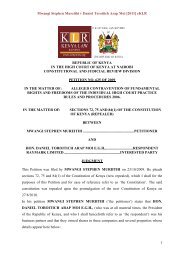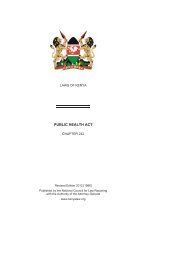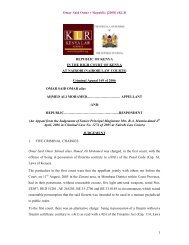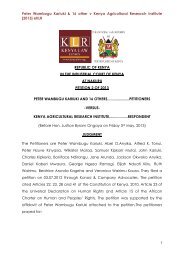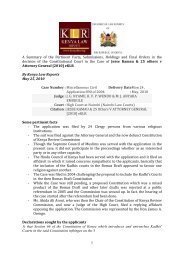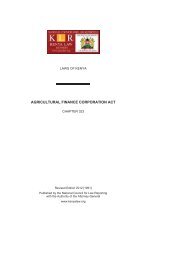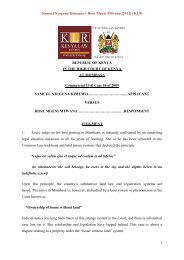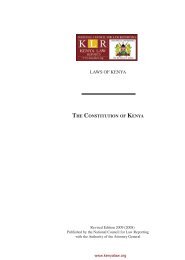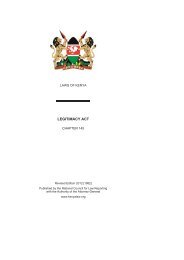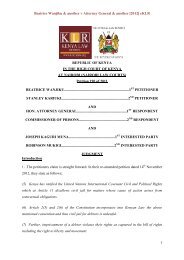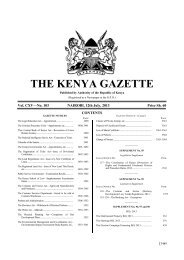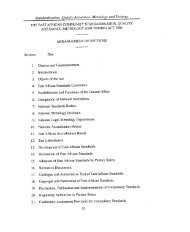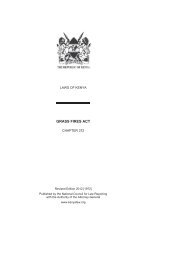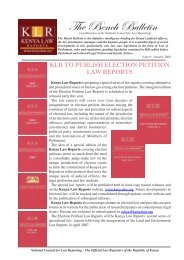Bench Bulletin - Issue 12 - Kenya Law Reports
Bench Bulletin - Issue 12 - Kenya Law Reports
Bench Bulletin - Issue 12 - Kenya Law Reports
Create successful ePaper yourself
Turn your PDF publications into a flip-book with our unique Google optimized e-Paper software.
KENYA LAW REPORTS<br />
BENCH BULLETIN<br />
FROM THE COURTS — HIGH COURT<br />
Burial dispute: Luo customary law and the burial of a married woman<br />
Charles Onyango Oduke & Another v Samuel Onindo Wambi<br />
Civil Case No 143 of 2009<br />
High Court, at Kisumu<br />
April 9,2010<br />
Ali Aroni. J<br />
Reported by Andrew Halonyere<br />
Customary law – burial dispute – deceased wish to be interred/buried in her piece of land – defendant’s (deceased<br />
father- in -law) claim that he had a customary right to decide the burial place - Luo customary law in regard to burial<br />
of a married woman – claim by the plaintiffs that the defendant and his family mistreated the deceased during her life<br />
time and were therefore undeserving to bury her remains – effect of the deceased wish vis a vis Luo customary law on<br />
burial – factors the court should consider when applying customary law – whether in the circumstances the wishes of the<br />
deceased should be respected – Judicature Act (Cap 8)section 3 (2).<br />
The first plaintiff was the brother of (Veronica), the deceased and the second plaintiff was the deceased adopted son.<br />
The two plaintiffs brought a suit in the High Court challenging the claim of the defendant, who was the deceased’s<br />
father-in-law, that he was entitled under Luo customary law to bury the remains of the deceased.<br />
The plaintiff’s case was that the defendant and his family mistreated the deceased during her lifetime and as a result<br />
of the mistreatment, the deceased had established a home in Kakamega and on many occasions declared to her family<br />
and friends her wish to be interred on the said piece of land, in the event of her death. The plaintiffs further submitted<br />
that although the deceased was a Luo by tribe and thus subject to Luo customary law, the defendant’s attitude did<br />
not accord him the customary law right to bury her remains and she ought to be interred on her land in Kakamega<br />
according to her wishes.<br />
The defendant on the other hand denied the allegation that the deceased had made a wish to be buried on her piece of<br />
land, arguing that if there was such a wish, it was not unequivocal as there was no other place to bury her other than<br />
in Kamagambo, Rongo District. The defendant submitted that interring her on his land would be in accordance with<br />
her personal law which was Luo customary law. The defendant further submitted that customarily the right to bury<br />
the deceased rested on him and did not lie with the plaintiffs, arguing that the deceased and his son remained married<br />
up to the time of her death. The defendant strongly contended that because his son was sick, as the head of the family,<br />
the right to bury the deceased lay with him.<br />
The main issue before the court was whether the deceased had left a wish stating where she wanted to be buried, if<br />
the answer was in the affirmative and what was the effect of the said wish against Luo customary law on burial of a<br />
married woman.<br />
Held:<br />
1. Section 3(2) of the Judicature Act (Cap 8) required that while applying customary law, the courts should ensure<br />
that the same was not repugnant to justice and morality, and cases on customary law should be decided based on<br />
substantive justice.<br />
2. The Courts ought to give effect to the wishes of the deceased as far as possible unless for good reasons for example<br />
if the wishes were contrary to custom.<br />
3. The conduct and attitude of the defendant and the family were such that they were undeserving to bury the remains<br />
of the deceased and they could not therefore be heard to claim a customary right.<br />
4. Substantial justice would only be achieved if the wish of the deceased was respected.<br />
5.Obiter “Although the defendant is undeserving to bury Veronica, his wish to bury her may be an attempt by him and<br />
the rest of the family to make amends with the dead.”<br />
The body of the deceased would be released to the First Plaintiff and the defendant or anyone of them for interment in<br />
the Kakamega property in accordance with Catholic rituals as the deceased had directed.<br />
Advocates<br />
Mr. S. K’opot and Mr. A. Oyuko for the plaintiffs<br />
Mr. C. Ayayo for defendant.<br />
66



